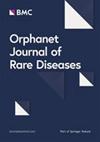CFTR modulators response of S737F and T465N CFTR variants on patient-derived rectal organoids
IF 3.4
2区 医学
Q2 GENETICS & HEREDITY
引用次数: 0
Abstract
Predictions based on patient-derived materials of CFTR modulators efficacy have been performed lately in patient-derived cells, extending FDA-approved drugs for CF patients harboring rare variants. Here we developed intestinal organoids from subjects carrying S737F- and T465N-CFTR in trans with null alleles to evaluate their functional impact on CFTR protein function and their restoration upon CFTR modulator treatment. The characterization of S737F-CFTR was performed in two subjects recently assessed in nasal epithelial cells but not in colonoids. Our functional analysis (Ussing chamber) confirmed that S737F-CFTR is a mild variant with residual function as investigated in colonoids of patients with S737F/Dele22-24 and S737F/W1282X genotypes. An increase of current upon Elexacaftor/Tezacaftor/Ivacaftor (ETI) treatment was recorded for the former genotype. T465N is a poorly characterized missense variant that strongly impacts CFTR function, as almost no CFTR-mediated anion secretion was registered for T465N/Q39X colonoids. ETI treatment substantially improved CFTR-mediated anion secretion and increased the rescue of mature CFTR expression compared to either untreated colonoids or to dual CFTR modulator therapies. Our study confirms the presence of a residual function of the S737F variant and its limited response to CFTR modulators while predicting for the first time the potential clinical benefit of Trikafta® for patients carrying the rare T465N variant.S737F和T465N CFTR变体的CFTR调节剂对源自患者的直肠器官组织的反应
最近,在患者来源细胞中进行了基于患者来源材料的 CFTR 调节剂疗效预测,为携带罕见变体的 CF 患者提供了经 FDA 批准的药物。在这里,我们从携带S737F-和T465N-CFTR反式无效等位基因的受试者中培养了肠组织细胞,以评估它们对CFTR蛋白功能的影响以及在CFTR调节剂治疗后的恢复情况。最近在两名受试者的鼻上皮细胞中评估了 S737F-CFTR 的特征,但没有在结肠中进行评估。我们的功能分析(Ussing 室)证实,S737F-CFTR 是一种轻度变异体,在 S737F/Dele22-24 和 S737F/W1282X 基因型患者的结肠中调查发现,S737F-CFTR 具有残余功能。前一种基因型的患者在接受 Elexacaftor/Tezacaftor/Ivacaftor (ETI) 治疗后,电流会增加。T465N是一种特征不明显的错义变体,对CFTR功能有很大影响,因为T465N/Q39X结肠几乎没有CFTR介导的阴离子分泌。与未经处理的结肠组织或双 CFTR 调节剂疗法相比,ETI 治疗大大改善了 CFTR 介导的阴离子分泌,并增加了对成熟 CFTR 表达的挽救。我们的研究证实了 S737F 变体的残余功能及其对 CFTR 调节剂的有限反应,同时首次预测了 Trikafta® 对携带罕见 T465N 变体的患者的潜在临床益处。
本文章由计算机程序翻译,如有差异,请以英文原文为准。
求助全文
约1分钟内获得全文
求助全文
来源期刊

Orphanet Journal of Rare Diseases
医学-医学:研究与实验
CiteScore
6.30
自引率
8.10%
发文量
418
审稿时长
4-8 weeks
期刊介绍:
Orphanet Journal of Rare Diseases is an open access, peer-reviewed journal that encompasses all aspects of rare diseases and orphan drugs. The journal publishes high-quality reviews on specific rare diseases. In addition, the journal may consider articles on clinical trial outcome reports, either positive or negative, and articles on public health issues in the field of rare diseases and orphan drugs. The journal does not accept case reports.
 求助内容:
求助内容: 应助结果提醒方式:
应助结果提醒方式:


